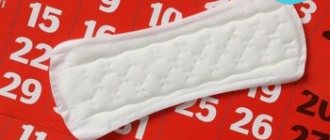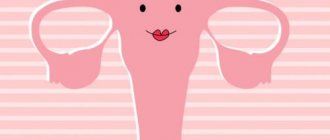Menstruation is a cycle of shedding of the uterine lining that repeats every month, accompanied by bloody discharge from the vagina. The meaning of critical days is the preliminary preparation of the female body for conceiving a child, and its subsequent development. During menstruation, the female body is exposed to painful sensations, pain in the chest, spasmodic pain in the lower abdomen is observed, body temperature rises, a feeling of chills appears, and there is often a headache. Each woman experiences this process in her own way, all on an individual basis.
Is it possible to treat teeth during menstruation?
Attention! During menstruation, pain can be severe; therefore, it is recommended to avoid any heavy physical exercise and take a day off from work.
What happens in the body during menstruation
Menstruation is not a disaster for the female body, but a regular occurrence that the reproductive system is able to cope with. However, menstruation is accompanied by a deterioration in well-being - from mild discomfort to a significant disruption of the rhythm of life. Various risks also increase.
A number of changes occur during menstruation
The cause of menstruation is the cyclic production of hormones in the female reproductive glands. Menstruation is a phase of hormonal hunger, when the second phase of the cycle (preparation for a possible pregnancy) has already ended (pregnancy has not occurred), and the first phase of the next cycle (ovum maturation) has not yet begun. In addition to bleeding from the genital tract, the following changes occur:
- Decreased hemoglobin levels due to bleeding.
- Reduced blood clotting.
- Emotional instability.
- General deterioration in health.
- Exacerbations of chronic diseases or greater susceptibility to infectious diseases are possible.
In this video you will find out whether it is possible to remove teeth during menstruation:
What procedures can be done during menstruation?
If a woman has her period, this does not mean that she should not go to the dentist. Of course, it is advisable to wait 1-2 days, when the discharge will be less intense, your health will be more stable, and the blood clotting process will normalize. But there are a number of dental procedures that can be performed regardless of the day of your cycle. These include the following manipulations:
- dental filling. If there is superficial caries or its 2nd degree, requiring only light cleaning of the damaged area, then filling the tooth during menstruation is allowed. This procedure is usually done without a painkiller injection and does not require subsequent antibiotics. Even if there is an infection, it does not spread widely enough to affect healthy tissue. No drainage or multi-stage therapy is required; treatment is performed in 1 visit. Menstruation does not affect the process of bonding between the filling and the tooth. The bone tissue will not be more fragile at this time and will not resist the placement of light-curing or any other material;
- dental prosthetics. This is a multi-stage procedure, so it does not matter what material is used. During one visit, the teeth are ground down, then an impression is made, fittings are carried out, and ultimately the structure is brought to the desired size. All these manipulations are not prohibited during menstruation. You can even install a prosthesis, with the exception of screwing in the pin for the implant;
- take an x-ray of your teeth. The manipulation is immediate and absolutely painless. The film is placed under the area of the gum that the doctor is interested in, and it is in this direction that the radiation goes. The rest of the body is protected in the form of plates that do not allow X-rays to pass through; for women, the pelvic organs and breasts are especially protected. The radiation will not affect the intensity of menstrual flow in any way;
- You can have your teeth cleaned at the dentist. Professional cleansing is mainly done with ultrasonic waves or a water-salt solution, so when your period arrives, there is no need to cancel the pre-arranged procedure. It lasts no more than 40 minutes and will not affect a woman’s cycle in any way;
- saturation of tooth enamel with missing minerals (remineralization). The procedure takes place in several stages and is carried out to increase the strength of tooth enamel and get rid of superficial caries. If you do not carry out 1 or more planned procedures, the infection may remain in the tooth, then all previous remineralization sessions will be useless. If your health during menstruation allows you to go to the dentist for this procedure, then you should not postpone the visit;
- It is possible to remove teeth during menstruation, but we will talk about the conditions for performing this procedure in a separate section.
If you come to see the dentist during your period, you should definitely warn the doctor about this, especially if it is necessary to remove one of the teeth. This is necessary to assess possible risks associated with the healing of the hole, the effect of pain medication, possible infection, etc.
If your teeth get sick just before the onset of menstruation, then you should not panic and immediately tear them out or fill them, because this may be one of the manifestations of premenstrual syndrome, when swollen tissue puts pressure on the nerve endings in the jaw area. In this case, you can get rid of toothache by stabilizing hormone levels with medicinal decoctions or taking painkillers.
What risks exist?
For those who are planning to treat their teeth during menstruation, there are restrictions that are important to remember. There are several main risks:
- Blood clotting and hemoglobin levels are reduced, so if bleeding occurs, it is more difficult to stop.
- Changes in the pain threshold and emotional perception - pain can be felt more strongly and cause strong rejection.
- There is a greater risk of infection - if an intervention occurs that could result in an infection, it is more difficult for the body to cope with it.
If the problem is not acute, then you need to eliminate the toothache at home using mouth rinses, and then, when your period is over, go to the doctor and have your teeth treated with minimal risk.
There are a number of nuances in dental treatment
Useful tips
It is not always possible to go to the doctor as soon as a tooth starts to hurt. This could be, for example, at night. To reduce pain, you can use the following recipes:
- Prepare a decoction of oak bark and chamomile. You should rinse your mouth with the product when it cools down. The infusion kills germs in the mouth.
- Propolis is a popular method of therapy. It has antiseptic properties. You can prepare an alcohol solution based on the plant and apply it to the sore spot.
- Salt and soda. They should be diluted in a tablespoon of water and rinsed in your mouth. The product will temporarily relieve pain.
- Boil the calamus root and cool it. Then you can rinse your mouth with the solution.
- Fir and clove oils can be dropped onto a cotton swab and applied to the sore spot. This remedy will not only relieve pain, but also improve the general condition of the body.
We suggest you read Why does the tongue hurt as if it were burned and how to treat it?
Now a woman knows what to do if her tooth starts to hurt during her period. If you feel unwell during this period, and a trip to the doctor can be rescheduled, then you should refuse to visit the clinic during this period. When the pain is severe, you should not try to endure it. It's better to call an ambulance. After the examination, the specialist will recommend what to do and prescribe medications to normalize the condition.
It is impossible to change anything in your body, so if you had to pull out a tooth during your period, then the only thing that can be done to reduce the risk of complications is to follow the following rules:
- Stop smoking or drinking alcohol for a while. Cigarette smoke is irritating to the mucous membranes and can also cause infection. Alcohol thins the blood, which means the risk of bleeding increases.
- Try to get some rest. Even if your condition is satisfactory, you should not be too active at least in the first 24 hours.
- Don't drink through a straw. This creates negative pressure in the mouth, and the blood clot in the socket can break off.
- Rinsing your mouth can be done only a day after tearing out, and then you need to do it carefully.
- Eat soft foods such as yogurt, soup, or mashed potatoes that don't require much chewing. Solid foods can damage the wound.
- Do not touch the resulting hole. At first, the missing tooth will cause discomfort, but try to restrain yourself and not touch the wound with your tongue or fingers.
Women who experience tender/bleeding gums or herpes outbreaks on certain days of the month should consider prevention. For example, a doctor may recommend using a special paste and brush, as well as taking a course of vitamins or medications against herpes.
Following all instructions will minimize the risk of infection, bleeding, and dry socket. But violating the rules for postoperative care is fraught with unpleasant consequences.
When treatment for a dental problem should not be delayed
In most cases, it is not advisable to treat and fill teeth during menstruation. However, there are situations when you cannot postpone oral treatment. These include acute purulent processes in the teeth and gums. A purulent inflammatory process that begins in the oral cavity spreads quickly, and a woman does not have time to wait for the end of her period.
Signs that you should see a doctor without delay:
- Acute pain that is difficult to relieve with painkillers.
- Sudden onset of bleeding gums.
- Inflammatory edema (flux).
- The appearance of pus.
- A sharp deterioration in health, the appearance of fever.
In this case, you cannot put off visiting the dentist for a minute, and start treating your teeth without waiting for the end of your period.
Pulling teeth during menstruation is only possible if there are urgent indications - the risk of purulent inflammation, jaw injury or other situations.
Why is it better not to treat teeth on critical days?
There are three reasons to postpone visiting the dentist until the end of your menstrual cycle.
1 reason. Blood clotting disorder. On critical days, a woman’s blood vessels dilate. If a tooth is removed during this period, it can lead to heavy bleeding, which only a doctor can stop.
Reason 2. Reduced pain threshold. Before menstruation, the female body produces prostaglandins. These are the hormones that start the process of menstruation. Thanks to them, the uterus contracts, its inner lining peels off and blood is released. Because of these hormones, a woman experiences pain and experiences any unpleasant sensations more intensely.
Reason 3. Risk of inflammation. During menstruation, blood clots more slowly than usual. Therefore, the holes in the oral cavity take several times longer to heal. The immune system is weakened and the body is vulnerable to infections. If a bacteria or virus enters an open wound, gum inflammation will begin.
Note. If on critical days a woman does not experience pain, discomfort and other unpleasant sensations, then dental procedures may not be tolerated. But you need to warn your dentist in any case.
What are the necessary safety rules?
The most important rule for safe dental treatment is that the woman must be warned about the possible risk. If there are no emergency indications or, conversely, strict contraindications to any manipulations, then it is the patient who makes the final decision when to undergo treatment. The doctor’s task is to provide complete and reliable information and help make an informed choice.
You can take medications that increase blood clotting before removing a tooth during your period only if prescribed by your doctor. The doctor also selects painkillers. The patient needs to inform the specialist in a timely manner about her feelings and warn him if it becomes painful or, conversely, there is an unusual reaction to the anesthetic. If necessary, the doctor may increase or decrease the dose of the drug.
A combination of several drugs (for example, a painkiller taken in advance during anesthesia) can give an unpredictable effect.
Do not forget about a number of contraindications
Tooth extraction during menstruation
The decision to remove a tooth during menstruation is made jointly by the patient and the dentist. Usually the doctor relies on:
- Diagnosis
- Disease severity
- General condition of the patient and her well-being
- What manipulations need to be done
If a woman feels well, but the toothache is persistent, most likely the dentist will decide on surgical intervention. In this case, the doctor must observe safety measures: select the correct dose of pain medication, administer a drug that improves blood clotting, and carefully monitor the patient’s well-being.
After tooth extraction, you need to monitor the patient’s condition, measure her blood pressure and, if all is well, give the necessary recommendations and send her home.
What dental procedures are allowed or prohibited?
There are a number of strict restrictions that must be observed. They are listed in the table.
| Allowed manipulations | Prohibited manipulations |
| Sealing | Tooth extraction if there is no urgent indication |
| Restoring a damaged tooth | Installation of fixed dentures |
| Treatment of shallow caries | Treatment of deep caries and pulpitis |
| Prosthetics without a pin | Any interventions on the roots of teeth |
| X-ray examinations | |
| Professional cleaning, whitening |
If during menstruation there is no need to remove a tooth or damage soft tissues, then there are not many prohibitions. All procedures that are not associated with the risk of vascular damage can be performed. Menstruation does not affect the effectiveness of caring and nutritional procedures, so they can be carried out at any time.
Restrictions during menstruation and pregnancy are not the same. For example, pregnant women should not undergo X-rays, professional cleaning and bleaching, or the application of nutritional gels - these can be postponed until a later time. During menstruation, such procedures are acceptable and do not cause harm.
Removing a wisdom tooth during menstruation, unless it is carried out for urgent reasons, is especially undesirable - due to the location of the tooth, the risk of bleeding is high, and it is very difficult to stop it. Such manipulations can lead to dangerous consequences.
Removal procedure
As mentioned above, the tooth is located in the jawbone, or more precisely in a certain place - the socket. This means that it is necessary to remove teeth only from the expanded socket in which it is located.
In this case, the dentist uses special forceps, with the help of which he loosens the tooth in the socket and expands the hole.
Thanks to this method, the hole expands and the tooth is separated from the soft tissue, which facilitates the extraction process.
There are cases when the tooth has become so firmly rooted in the socket that it makes the process of loosening and further extraction difficult. Only one thing will help here: cutting the gum or crushing the tooth and then extracting it piece by piece. As you guessed, new teeth can only be grown artificially using implantation or prosthetics.
Often, after the removal procedure, blood oozes from the hole. To stop it, it is necessary to apply a cotton swab or ball, which the patient bites.
How to relieve toothache at home
At home, painkillers and mouth rinses come to the rescue. Professional dental care products not only prevent various pathologies, but also help temporarily relieve pain. This cannot replace treatment, but it will help you wait until the end of your period.
Painkillers are used for severe toothache, but this is only symptomatic treatment. For the same purpose, herbal rinses with chamomile, sage, St. John's wort and oak bark are used. All these methods do not replace treatment with a dentist.
Preparation for the procedure
To reduce the risk of bleeding after tooth extraction during menstruation, you need to first prepare for the procedure; for this you need to follow the following recommendations a couple of days before your visit to the clinic:
- do not drink alcohol and strong drinks;
- drink less coffee;
- do not subject the body to intense loads, stress and nervous strain;
- do not overcool or overheat;
- not to undergo surgical interventions;
- take drugs that increase blood clotting;
- If you systematically take any medications, be sure to inform your dentist about this.
There are cases when a patient enters the clinic with acute pain and just during her critical days, she simply does not have the opportunity to prepare in advance for the operation. In this case, we must not forget about the increased risk of postoperative complications, which are easier to prevent than to cure. To prevent negative consequences after tooth extraction, you need to follow the following recommendations:
- take all prescribed medications and do the required number of mouth rinses, while self-medication and outside advice are not allowed;
- after the manipulation, wait in the clinic for some time so that the dentist can make sure that blood clotting is normal and the hole is healing after tooth extraction;
- take a taxi home, especially in extremely low and high ambient temperatures, because extreme cold or stuffiness in public transport can cause a deterioration in a woman’s health.
If after tooth extraction the temperature rises, nausea and dizziness appear, you should immediately consult a doctor; you should also not drink alcohol, take a bath or visit the steam room immediately after the intervention. In order not to harm your health, you should also not engage in excessive physical activity.
These are all general recommendations; in each specific case, the woman, together with the dentist, decides on the need for dental treatment during her period. If this time passes without much discomfort for a woman, then there is no point in postponing a visit to the dental clinic, since delay can cause a deterioration in her health.
Is it possible to use anesthesia during menstruation?
Many representatives of the fair sex experience panic fear before any dental procedure. They insist on using anesthesia even when treating superficial caries or performing professional cleaning. In addition to the psychological fear of dentists, there are often cases when a woman has a low pain threshold, which in the absence of a good pain reliever can lead to loss of consciousness, especially if it is necessary to pull teeth.
Of course, a modern dentist has various means of anesthesia in his arsenal, but the effectiveness of any of them can be significantly reduced when used during menstruation. When sitting in the dental chair, a woman should understand that during menstruation, anesthesia may not work at all. It is for this reason that it is necessary to prepare in advance for the fact that painful sensations will have to be endured.











